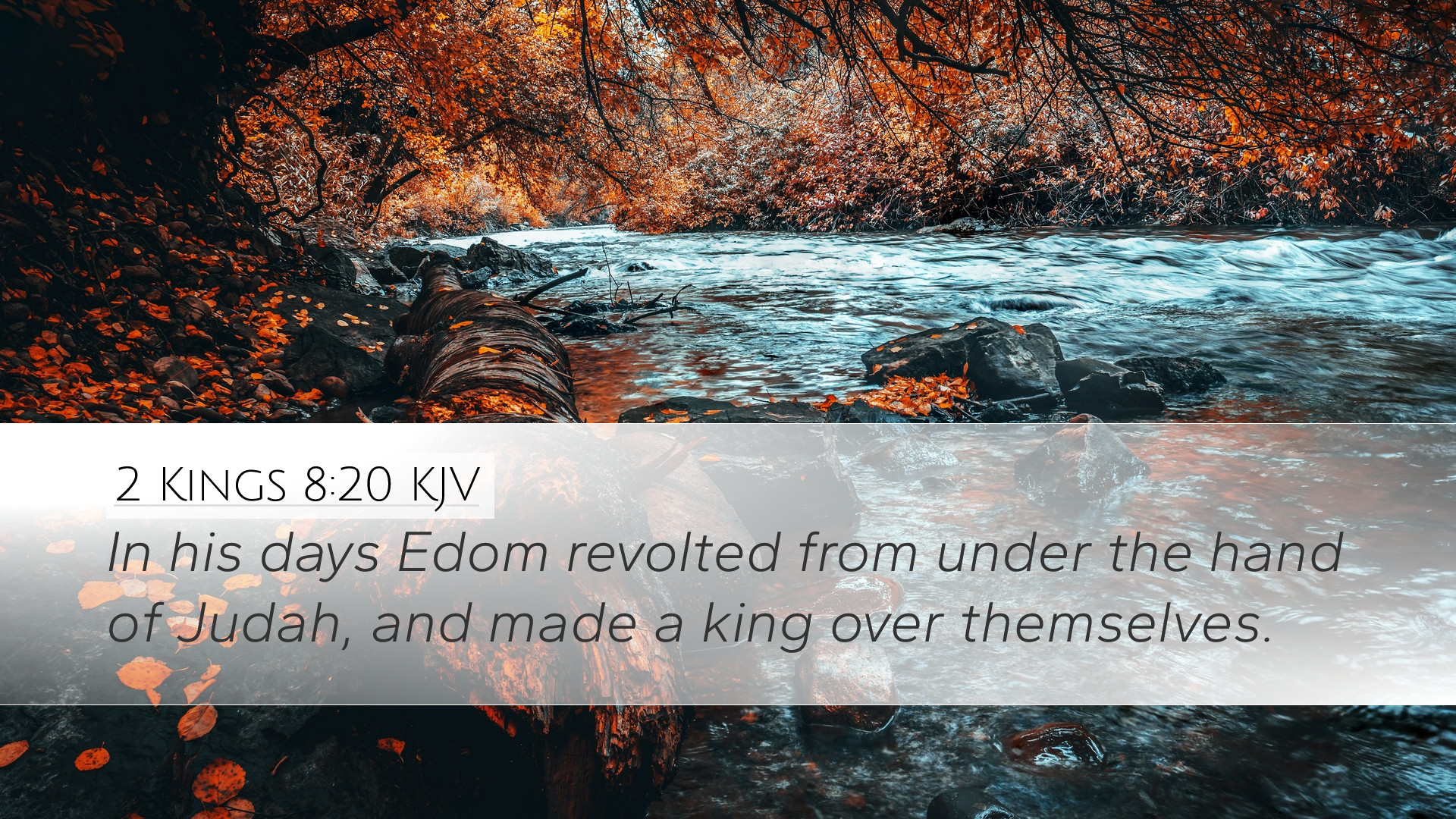Commentary on 2 Kings 8:20
Bible Verse: "In his days Edom revolted from under the hand of Judah, and made a king over themselves."
Introduction
The narrative in 2 Kings 8:20 marks a significant turning point in the political landscape of Judah during the reign of Jehoram, the son of Jehoshaphat. The revolt of Edom is not merely a political maneuver; it symbolizes a deeper spiritual decline in Judah and highlights the implications of leadership and idolatry on a national level.
Historical Context
The historical backdrop of 2 Kings 8:20 is crucial to understanding its meaning. Under Jehoshaphat, Judah experienced a period of relative stability and prosperity. However, Jehoram's reign saw a departure from the faithfulness of his father. His marriage to Athaliah, daughter of Ahab, introduced Baal worship into Judah, which ultimately led to God's judgment against the kingdom.
Key References:
- 2 Chronicles 21:1-20 - The account of Jehoram’s reign and the consequences of his actions.
- 1 Kings 22:42-50 - Jehoshaphat's legacy and the political alliances formed that led to spiritual compromise.
Commentary Insights
Albert Barnes notes that the revolt of Edom serves as a clear indication of the diminished authority of Judah. Under Jehoram's weak leadership, Edom seized the opportunity to assert its independence. This act reflects not just a political rebellion but also a moral decay, as it signifies how far the nation strayed from God. The rebellion was a fulfillment of the prophetic word that spoke of calamities befalling Judah due to their apostasy.
Jehoram's Leadership Failures
Matthew Henry expounds on the failures of Jehoram's leadership. He emphasizes Jehoram's alignment with wickedness through his marriage and alliances, which went against God’s commandments. This alignment weakened his standing both before the major nations surrounding Judah and before God Himself. Jehoram's inability to maintain the loyalty of Edom can therefore be seen as direct consequences of his spiritual compromise.
Significance of Edom's Rebellion
The revolt of Edom under a newly established king highlights the broader theme of divine retribution that runs throughout the history of Israel and Judah. Adam Clarke points out that geopolitical shifts are often reflective of spiritual realities. The text is an admonition to leaders about the importance of maintaining integrity and faithfulness to God, as even the mightiest kingdoms can falter when they turn away from divine guidance.
Spiritual Lessons for Modern Readers
This passage contains significant lessons for contemporary theologians, pastors, and scholars:
- Integrity in Leadership: Leaders are called to uphold godly standards in their personal and public lives. Jehoram’s failure teaches that alignment with ungodly practices invites turmoil.
- The Consequence of Idolatry: The introduction of Baal worship had dire consequences. As modern readers, we are reminded of the necessity of prioritizing devotion to God over cultural conformity.
- Divine Sovereignty: Edom's revolt is not just a political incident; it illustrates God's overarching plan where He allows nations and leaders to rise and fall based on their faithfulness. This calls for trust in God's sovereignty in the midst of turmoil.
Concluding Thoughts
2 Kings 8:20 encapsulates a poignant moment in the history of Judah, serving as a reminder of the intersection between faithfulness to God and the outcomes of leadership. As pastors and scholars reflect on this passage, let it inspire a commitment to remain steadfast in God's truth, ensuring that both personal and communal paths align with divine principles.


